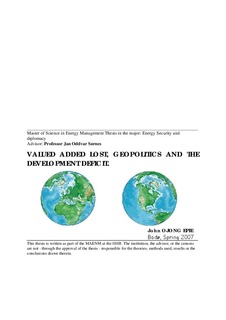| dc.description.abstract | More than 60 years after the end of World War II, which saw the emergence of new sovereign
states, the world is still experiencing a sort of development deficit. At least four fifths of the
world’s countries are still struggling to achieve dynamic self sustaining economic
development. Many commonly cited reasons for the short fall in development usually appear
like the symptoms rather than the causes and tend ignore historical aspects. This study
proposes to take a look in retrospection at both the economic and geopolitical conditions that
were prevailing in the better part of the twentieth century when a host of new states were
established. The paper argues that the mix of international economic and geopolitical
conditions in the twentieth century especially in the three post-World War II decades
presented conditions that were unfavourable to sound economic and social development for
the majority of the world’s newly formed countries, from among which only four managed to
operate a spectacular economic transformation. After establishing the theoretical premise, the
paper strives to back the case through wide ranging general analysis and specific country
cases. In the end the paper puts the development process into perspective to emphasize that
the present lateness in development should necessarily be a transient one, albeit which can
hardly be curbed a country level without benign stimuli from favourable world economic and
geopolitical conditions.
Key words and phrases : Development, capital accumulation, geopolitics, export promotion,
import substitution, comparative advantage, cold war, incremental capital-output ratio,
multinationals, valued added, high income, low income, low-middle income, upper middle
income, newly industrialised countries, primary commodities, manufactures, oil shocks | |
